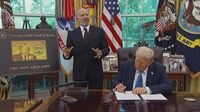President Donald Trump’s latest move on immigration has thrown the U.S. tech sector and foreign skilled workers into a storm of confusion and concern, after a proclamation issued on Friday, September 19, 2025, imposed a staggering $100,000 fee on new H-1B visa applications. The announcement, which took effect at 12:01 a.m. ET on Sunday, September 21, 2025, left companies and immigrant workers scrambling to understand the implications, while government officials and agencies raced to clarify the new rules.
The H-1B visa program, often described as the backbone of America’s high-skilled labor force, is used by approximately 750,000 workers to fill roles that require at least a bachelor’s degree. According to Squire Patton Boggs, the program has long been crucial for technology companies, hospitals, and research institutions that depend on global talent to stay competitive.
The initial language of Trump’s proclamation, titled “Restrictions on Entry of Certain Nonimmigrant Workers,” seemed to bar any H-1B visa holder from entering the United States without first paying the new $100,000 fee. The immediate aftermath was chaos: some foreign workers reportedly canceled plans or scrambled to return to the U.S. before the effective date, fearing they’d be locked out or forced to pay the fee upon re-entry. In Denver, according to local reports, travelers even disembarked from planes departing the U.S. due to confusion about their ability to return.
“I think that we all found out the news together just late on Friday afternoon,” said Zachary New, an immigration attorney and partner at Joseph & Hall P.C., in an interview with local media. He described the mood among employers and workers as “a sense of panic,” especially since there was no immediate mechanism in place to pay the fee. “So even if a business wanted to hire somebody in H-1B status, there’s not just a place they can send a $100,000 check.”
Over the weekend, the White House and various government agencies scrambled to clarify. In a post on X, White House press secretary Karoline Leavitt explained, “Those who already hold H-1B visas and are currently outside of the country right now will NOT be charged $100,000 to re-enter. This applies only to new visas, not renewals, and not current visa holders.” Official guidance from U.S. Customs and Border Protection (CBP), USCIS, and the Department of State further confirmed that the fee “only applies prospectively to petitions that have not yet been filed” as of the effective date. In other words, individuals with approved petitions or valid visas issued before September 21, 2025, are not affected.
Still, the confusion was palpable. Immigration attorney Kathleen Campbell Walker called the rollout “total chaos in existing H-1B process with basically a day’s notice,” as quoted by Dickinson Wright. Tech giants including Amazon and Microsoft reportedly advised their H-1B employees not to leave the country, or to return as quickly as possible if they were already abroad.
The fee, which replaces the previous $215 charge, is scheduled to expire after one year but could be extended if deemed in the national interest. Commerce Secretary Howard Lutnick initially told reporters the fee would be an annual cost for companies, but a White House official later clarified it’s a one-time fee—though the policy could change. Lutnick was blunt about the administration’s intentions, stating, “The whole idea is no more of these big tech companies or these big companies train foreign workers. If you have a very sophisticated engineer and you want to bring them in ... then you can pay $100,000 a year for your H-1B visa.”
For the vast majority of H-1B workers—more than 70% of whom are from India—the move is especially consequential. India’s Ministry of External Affairs voiced its concern, warning that the measure could have “humanitarian consequences by way of the disruption caused for families.” The ministry added that it hoped disruptions could be “addressed suitably by the U.S. authorities.”
The tech sector, which relies heavily on H-1B talent, was left reeling. Nvidia, one of the largest employers of H-1B holders, had 1,519 H-1B filings out of 36,000 employees worldwide at the end of fiscal year 2025, according to Business Insider. Yet, in a surprising twist, Nvidia CEO Jensen Huang expressed support for Trump’s decision. “We want all the brightest minds to come to the United States. Remember immigration is the foundation of the American dream, and we represent the American dream,” Huang told CNBC. “I’m glad to see President Trump making the moves he’s making.” OpenAI CEO Sam Altman echoed the sentiment, saying, “We need to get the smartest people in the country, and streamlining that process and also sort of aligning financial incentives seems good to me.”
Despite these endorsements, many in the business community are deeply worried. The U.S. Chamber of Commerce stated, “We’re concerned about the impact on employees, their families and American employers. We’re working with the Administration and our members to understand the full implications and the best path forward.”
Legal experts warn that the fee may act as an “absolute restriction” on the program, rather than a legitimate fee structure. “If an individual is going to cost $130,000 for you to hire them, there’s no incentive whatsoever for you to move forward with the process and actually hire that individual,” Zachary New observed. He also noted that the timing particularly affects nonprofit entities, such as hospitals, churches, and schools, which typically file H-1B petitions in the fall and winter.
The proclamation also introduces other sweeping changes. Trump announced a $1 million “gold card” visa for wealthy individuals, with a $5 million “platinum card” allowing foreigners to spend up to 270 days in the U.S. without being subject to U.S. taxes on non-U.S. income. The gold and platinum cards, according to Lutnick, are intended to replace employment-based visas that offer a path to citizenship for professors, scientists, artists, and athletes. For companies, sponsoring an employee for the gold card will cost $2 million.
Critics of the H-1B program, such as the advocacy group U.S. Tech Workers, applauded the move as “the next best thing” to abolishing the visas altogether. On the other hand, Doug Rand, a former senior official at U.S. Citizenship and Immigration Services, called the fee “ludicrously lawless,” arguing, “This isn’t real policy—it’s fan service for immigration restrictionists.”
While the White House insists the fee will help ensure the visa is reserved for the most highly skilled workers, experts warn it could dramatically reduce the number of H-1B visas issued—currently capped at 85,000 annually—and limit legal immigration pathways at a time when U.S. companies are already struggling to fill specialized roles.
As the dust settles, businesses, immigrant workers, and their families await further guidance from federal agencies and the courts. With lawsuits and additional rulemaking likely, the future of high-skilled immigration to the United States remains, for now, very much up in the air.






